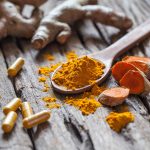Changing Laws and Emerging Research
Medical Marijuana is now legal in 23 states in the US, and over a million people are using it to treat a wide variety of diagnoses, including autoimmune disease. When I interviewed Dr. Datis Kharrazian in Podcast Episode 21, he mentioned that cannabanoids (components of marijuana) help regulate the immune system. Not only that, but research is showing that marijuana can reduce inflammation, relieve pain, suppress muscle spasms, reduce anxiety, treat psoriasis, aid digestion, and much more. Today, we delve into the science behind this controversial herb and talk with a number of people who are using it as part of their autoimmune disease treatment.
Listen to the Show
- Subscribe to my podcast through your favorite podcast app: iTunes, Stitcher, Google, TuneIn, Spotify, Amazon, etc.
- You can also listen to the episode right here through the player below, and if you subscribe to my newsletter you’ll get notified of future episodes.
Podcast: Play in new window | Download
Show Notes
- Intro (0:00)
- Meet Adam (0:51)
- Adam Farrah is the author of the book, The Paleo Dieter’s Missing Link.
- Journalist for Paleo Magazine, where he has researched and written on this topic.
- He reversed his own ulcerative colitis through the paleo diet and lifestyle. At his worst in 2004, he had non-stop bloody diarrhea and dropped to 120 lbs, requiring blood transfusions. The drugs prescribed were ineffective, so he started experimenting with diet and lifestyle. Through trial and error, he came to paleo, and he also made dramatic changes to remove the stress from his life, eventually putting his colitis into remission. While he still has some lingering health issues, he hasn’t experienced a flare in 6 years.
- He started using medical marijuana when it became legal in Connecticut 1 year ago, to help with sleep and anxiety. He was able to wean off Xanax which he had been taking for 4 years.
- My New Book – A Simple Guide to the Paleo Autoimmune Protocol (1:42)
- Small enough to fit in your purse or backpack.
- Simple enough that even someone with brain fog can understand.
- Written like a conversation between friends.
- Available in hardcopy and kindle versions on Amazon.com on 1/1/16 – Stay tuned!
- Thank You to our Podcast Sponsor – Paleo on the Go (2:17)
- A frozen meal delivery service, they have a large menu of items for the paleo autoimmune protocol (AIP).
- Use the code PHOENIX for 10% off your first order.
- The Science of Marijuana (17:38)
- Marijuana contains between 70-100 bioactive compounds. Most of them are in very small amounts. The primary ones are THC (which is responsible for the “high”) and CBD (which doesn’t have psychoactive effects). Both have potential therapeutic effects on autoimmune disease. There are also small compounds called terpenes, that create an “entourage effect” that makes different strains of marijuana work uniquely from one another.
- Methods of Taking Marijuana (20:29)
- Smoking the whole flower (pipes, joints)
- Vaporizing the whole flower (similar to e-cigarettes)
- Odorless Concentrates (hashish, kief, waxes, shatter, dabbing)
- Edibles (One paleo edible company is Jambo Superfoods and Theraplant is currently pursuing certification through The Paleo Foundation.)
- Tinctures
- Capsules (controlled dosage of extracted compounds)
- Topicals
- Resource article: methods of consumption
- Marijuana Laws (27:50)
- It’s legal in 23 states plus DC. Where it’s illegal, laws vary between decriminalization and mandatory sentencing. You can check the status of your state law here.
- Here’s a list of marijuana laws in other countries.
- Different Strains of Marijuana (31:02)
- When you buy marijuana from a legal dispensary, there are labels telling you what compound concentrations exist in the strain you’re buying, and they have also been lab tested to be clear of heavy metals, bacteria and toxins. You get both information and transparency.
- Marijuana naturally has more THC than CBD. Anything over 1% CBD has been bred for medical use. Some higher-CBD strains are Canna Sue and Hailey’s Hope which have close to a 1:1 ratio of THC and CBD. Then, there’s Charlotte’s web that was bred for a child with epilepsy and is high CBD/Low THC (and therefore doesn’t produce a “high”.)
- Another option if you don’t want any high effect from marijuana is to buy isolated CBD capsules and tinctures.
- Potential Side Effects of Marijuana (36:35)
- While marijuana can relieve anxiety, it can also cause it. Other potential side effects include dry mouth, dry eyes, blood pressure fluctuations, headaches, dizziness, nausea, numbness, hallucinations, impaired mental function, depression, sexual dysfunction and lung problems.
- Be cautious when first experimenting – start low and slow – with the smallest dose and wait to see how it affects you before increasing.
- When smoking marijuana, you will usually feel the effect within 30 minutes. With edibles, it can take hours, so be extra cautious with dosage there.
- Cost is also a challenge, since it isn’t covered by insurance. You can spend $400-800/month on medical marijuana.
- How Does Hemp CBD Oil Differ from Marijuana (39:35)
- If you’re in a state where marijuana remains illegal, the only legal choice is Hemp CBD Oil which you can buy online. It’s made from hemp, not marijuana. It contains less than 0.3% THC and has no psychoactive effect, which is why it’s legal in all 50 states.
- Because it contains a different blend of plant compounds, it works differently than marijuana, but many people do find it beneficial.
- There’s a wide variety of quality among the CBD oils sold online. Seek a reputable supplier who has independent lab testing verifying what’s in their product. Also be sure to check the full ingredient list, as there are often non-paleo fillers and carrier oils as well as added ingredients like ashwaghanda which is a nightshade.
- A high-quality paleo-friendly brand is NuLeaf CBD Oil.
- Resource: CBD Oil and Autoimmune Disease.
- How Medical Marijuana Dispenseries Work (46:06)
- Lauri Zrenda is a pharmacist and co-owner of Thames Valley Alternative Relief in CT. They serve 1000+ patients.
- The diagnoses in Connecticut that are approved for marijuana are: cancer, Crohn’s disease, epilepsy, glaucoma, HIV, multiple sclerosis, Parkinson’s disease, PTSD, spinal cord injury and wasting syndrome.
- Once a physician has confirmed one of these diagnoses, you are registered with a medical marijuana card and go to the dispensary. There, Lauri and her staff ask you about your symptoms and what you are looking to alleviate, and also your preference for method of consumption. She then guides patients to the strains and forms that will hopefully work best for them. It usually takes some trial and error to find the right one for each individual.
- There are hundreds of strains of medical marijuana available; her dispensary offers around 25 varieties.
- She has one patient with MS who used a walker prior to trying medical marijuana and now no longer needs her walker. She has another patient who came to the dispensary for cancer symptom relief, but she also had rheumatoid arthritis, and the medical marijuana drastically reduced her inflammation. She can make a fist for the first time in years.
- Meet Beth (53:05)
- Beth Schultz lives in Oregon, where marijuana is completely legal. She’s taking it for multiple sclerosis and chronic lyme disease. Her neurologist recommended it to her 7 years ago, and she got a medical prescription at that time. It reduced her pain substantially but she still needed other prescription medications as well. Two years ago, she started using food as medicine, and that combined with medical marijuana allowed her to get off all of her other medications. The form that works best for her are marijuana oil capsules with a 1:1 ratio of THC and CBD. Beth follows The Wahls Protocol. She recommends the book: Cannabis for Lyme Disease and Related Conditions.
- Meet Emily (59:47)
- Emily Williams lives in California where medical marijuana is legal. She’s taking marijuana CBD oil capsules for rheumatoid arthritis. She wasn’t able to tolerate conventional RA medication, and her pain had gotten so bad she felt suicidal. Friends encouraged her to try medical marijuana and her pain reduced instantly from a 10 to a 2. However, the capsules are very expensive, so she switched to low-dose naltrexone as her primary medication. She now takes the CBD oil capsules for breakthrough pain, which usually only happens if she goes off the paleo AIP diet. She chose the CBD oil because she didn’t want any psychoactive effects.
- Meet Catie (1:08:49)
- She lives in a state where medical marijuana is illegal, so we are keeping her last name anonymous. She has tried both the hemp CBD oil and smoking marijuana for Crohn’s disease. Traditional immunosuppressants were never able to put her in remission. The addition of marijuana and a paleo-style diet allowed her to achieve remission for the first time in her life. She has been able to go off steroids altogether and reduce her immunosuppressant medication as well. She finds that the hemp CBD oil has a calming, anti-anxiety effect and helps her sleep, but wasn’t enough by itself to alleviate her Crohn’s symptoms. The marijuana, which contains the THC, is necessary for her. She feels best when she takes them both together, because she doesn’t have access to a high-CBD strain of marijuana.
- Outro (1:23:15)
- Eileen (your podcast host) is the author of multiple books, written to help people thrive with autoimmune disease. Learn more on the Books Page.
- If you like this podcast, follow or subscribe through your favorite podcast app. You can also subscribe to Eileen’s biweekly newsletter.
- Check out the entire archive of podcast episodes.
You May Also Be Interested In
Spreading the Word
If you like the podcast, please leave a positive review in iTunes. It would mean the world to me, and also helps others find the podcast. Here are some quick instructions using your iPhone:
- If you are already subscribed to my podcast: (1) Click the purple podcast icon. (2) At the bottom of the screen, click Library. (3) At the top of the screen, click Shows. (4) Click the Phoenix Helix podcast image. (5) Scroll down the page, and you’ll see Ratings and Reviews. Scroll down a little bit more and click on Write a Review. This will bring up the review screen. Tap 5 stars (if you love the podcast), and then click in the title box, and it will bring up the keyboard. Enter a title and short review. (6) Click Send in the upper right corner. (7) Thank you! Positive reviews give the podcast a higher search ranking in iTunes, helping people find it and letting them know it’s a quality podcast and worth their time to listen.
- If you haven’t subscribed to my podcast: (1) Click the purple podcast icon. (2) In the lower right corner, click the magnifying class. (3) Type Phoenix Helix in the search box. (4) Click the podcast cover in the Show list. (5) If you’d like to subscribe, click the + sign at the top of the screen. (6) To write a review, scroll down the page, and you’ll see Ratings and Reviews. Scroll down a little bit more and click on Write a Review. This will bring up the review screen. Tap 5 stars (if you love the podcast), and then click in the title box, and it will bring up the keyboard. Enter a title and short review. (7) Click Send in the upper right corner. (8) Thank you! Positive reviews give the podcast a higher search ranking in iTunes, helping people find it and letting them know it’s a quality podcast and worth their time to listen.










I listened to this podcast this last summer. (I know, late to the game). Anyway, I ordered both cbd oils from the links provided. I have been blessed with improved blood work! My CK has been going down! Thank you so much! I am now a believer! I never, thought i would be a medical marijuana supporter! But I do know this, the hemp oil is doing wonders for my overlapping autoimmune diseases!
Thank you!
Tracy, that is so awesome! Thank you so much for sharing your experience. Here’s to all the ways we can maximize our health
We all should be believers in CBD. This compound could do wonders for our health
I have autoimmune and stiff person syndrome only one in a million get it I was wondering which one would be good for me
Janine, since we aren’t doctors, we cannot give medical advice. The first step would be getting a prescription, if you live in a legal state. Then, the staff at the medical marijuana pharmacy can tell you about your options. There is likely some trial and error in this process, as you find what works best for you.
Fantastic work! You are providing great info about Medical Marijuana and Autoimmune Disease. Thanks for sharing this great post with us.
Great podcast Eileen, I also found this cancer treatment article to be helpful so you could include it in your post http://idweeds.com/cbd-cannabis-cancer-treatment/
Thanks for sharing Agustina.
Would this be something to give to a dog too?
Like mixing it with food or something.
Thank you!
Liz
Hi Liz. I would think you would want to reduce the dose according to the size of the dog and maybe do some research on its use for pets first. I can see where it might be helpful, but I don’t have any specific knowledge about it.
I have been wondering about so many things you covered here, and I am so glad to see this. Thank you. If anyone has the name of a good, honest, helpful doctor to talk to and prescribe in San Diego, I would appreciate it. I know there is a dispensary not far from me.
Beth, I suggest visiting the dispensary and asking them to recommend a doctor.
We live in a state where medical marijuana is illegal. My husband has been diagnosed with cancer which is the aggressive kind. He has been in treatment for a year and still has cancer cells. He is due for a kidney workup this month. We decided to inquire about using cannabis oil. Mike tried edible oil and did not like the side effects. We were told by our supplier to use Systa Choline, but can’t find it anywhere. Checked out cholines and there are so many kinds. Can someone enlighten us as to what type of choline to use?
Hi Dolores. I’m not familiar with that. You can try contacting Adam through his website, to see if he has any advice: Adamfarrah.com
Thank you so much for covering this important topic for autoimmune disease. I liked that you interviewed so many different people. I disagree with Adam’s comment that smoking the flower is more potent than vaporizing. I think the opposite is true. You can control the temperature more with vaporizing and it is cleaner for your lungs. Also, you do get the benefits of the terpenes as much or more with vaporizing. I had to laugh when Adam said that people in their 60s and 70s would just eat a cookie from a dispensary because they would be naive about cannabis. Folks from this generation were smoking pot before Adam was even born!! I personally have found relief for my Sjogren’s Syndrome with a combination of THCa tincture and CBC tincture.
Phoebe, thanks so much for sharing your experience. It’s all so individual, isn’t it? My husband (an old hippie) also laughed at the comment about people in their 60s and 70s. I think my parents generation (late 80s) aren’t very comfortable with marijuana but the hippie generation certainly is!
I was wondering if Beth Shultz would mind sharing the name of her neurologist? I am in the PNW area would be interested in speaking with such a progressive neurologist! Thank you for a great show.
Michelle, I sent an email to Beth and she replied with the name: Laura Schaben, M.D., Neurologist | Bend Neurological Associates.
Thank you so much for following up!
I have been taking cannabis oil for my RA for 7 months (at the very kind advice of my dental hygienist) … I feel my strength coming back .. Range of motion very much improved … Pain is way down to 2 or 3 on most days …. I’m off the couch .. Way more energetic … I take no prescription meds … Occasional Advil or Tylenol 🙂 my dose is the size of a grain of rice at bedtime 🙂
Diane,
That is so inspiring! Was wondering if you’d be willing to share any more about how you take it, in a capsule, tincture, etc? Or any specifics about what kind, although I can also ask here at a dispensary. I’ve only tried the topicals for pain and this has been suggested by an MD here, but I’m still not sure on the what’s and how’s. Thanks!
Diane replied by Email. Here’s what she wrote: “Good morning Felicia. My oil comes in a little tiny jar … Other dispensaries sell in plastic syringes… (Which is easier to measure and dispense). My “compassion” oil is comparable to phoenix tears or the Rick Simpson oil … The difference is mine is made with olive oil or coconut oil … (Not s dangerous solvent). Check out Rick Simpson oil on line … There are recipes to make your own (if you desire). I buy mine from a non profit organization who have been in the medical m business for 17 years. Hope this helps somewhat Felicia. ~ Diane”
What a powerful testimonial. I’m so glad you’ve seen such great results, Diane!
Thanks, Diane, that’s really helpful information, I will check that out!
Thank you so much for covering this important topic! I’ve been wanting to know more about options specifically for these conditions, and this really helps. I’ve been trying the topicals for psoriatic arthritis, and have been unsure about the other forms, and the expense is a big issue so hopefully we’ll have better options as time goes on.
Felicia, how have you responded to the topicals?
The topicals definitely take the edge off but don’t completely alleviate pain for me. I like the ones in a lotion with other ingredients like lavender and arnica, but I’m still experimenting and asking people what they like and what works. Pricey though, $18 for a very small bottle, so a luxury for me at this point.
Thanks for sharing the details, Felicia, especially since no one on the podcast had experience with topicals.
Oh sure, and like the other folks mentioned, the people at the dispensaries here know a lot about what works. Pretty promising for arthritis, I am hoping the prices drop some too.
I just went to visit my first Marijuana dispensary where I live. It is legal here and it was a wonderful experience. I wanted to find out more about the availability of getting some non-THC marijuana for certain health issues. They were wonderful people who enlightened me regarding my choices. I must see a qualified doctor first to get a prescription and I was told the cost is about $250. I am going to pursue this further. There are many articles out regarding ways in which Marijuana can help many of us, for many ailments. I feel it is a safe and plant based remedy that is all natural, and so I am all for it.
I’m so glad it’s legal in your state, Gloria. I hope it makes a big difference for you!
$250? Yikes! My license was $60.00
I feel like this is a topic people tip toe around and are afraid to speak about openly, which is frustrating because there are so many of us who are curious if it could help us {myself included – and it’s legal in my state}. Thank you all for opening up and sharing your experiences.
I don’t think I could have recorded this podcast even 5 years ago, because the stigma was still so strong. I’m glad that’s changing!